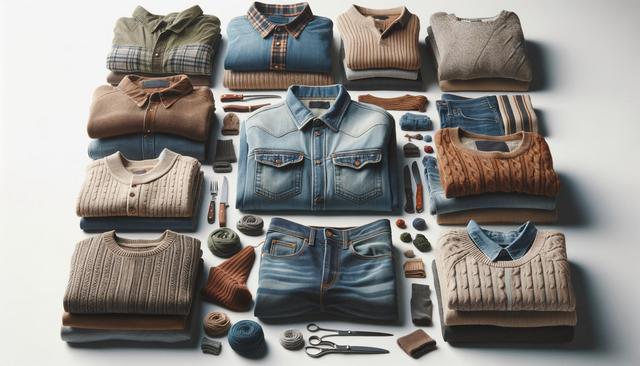The Environmental Benefits of Wearing Used Clothes
One of the most compelling reasons for the growing interest in used clothes is their positive environmental impact. The fashion industry is known to be one of the largest contributors to global carbon emissions, water consumption, and textile waste. By choosing second-hand garments, consumers can help reduce the demand for new clothing production, which in turn lowers the environmental footprint.
Every piece of clothing that is reused means less waste in landfills and less energy used in manufacturing. Textile production consumes vast amounts of water and chemicals, and many garments end up discarded after only a few uses. Opting for used clothes helps combat these issues by extending the life cycle of clothing that has already been made. Here are some additional environmental benefits:
- Reduces textile waste in landfills
- Decreases demand for new resource-intensive production
- Minimizes chemical pollution from dyeing and processing
- Encourages a circular economy in fashion
By understanding the environmental impact of our wardrobe choices, more people are turning to used clothes as a practical way to support sustainability.
Economic Advantages of Buying Second-Hand
Used clothes offer a cost-effective alternative to buying new apparel. Whether shopping at thrift stores, online marketplaces, or swap events, consumers can find a wide variety of clothing at a fraction of the original retail price. This makes fashion more accessible to people across all income levels, enabling them to dress stylishly without overspending.
Affordability isn’t the only economic benefit. Buying used clothes also supports local economies. Many second-hand stores are small businesses or charitable organizations that reinvest their earnings into community initiatives. Additionally, selling or donating used garments can provide value back to the original owner, creating a more balanced and efficient economy for clothing.
Some key economic benefits of used clothing include:
- Lower costs for consumers
- Increased access to high-quality garments
- Support for local and nonprofit businesses
- Opportunities for personal resale and income generation
These financial incentives contribute greatly to the increasing demand for second-hand fashion.
Unique Style and Vintage Appeal
Used clothes also appeal to fashion enthusiasts who seek originality and character in their wardrobe. Vintage and second-hand garments often feature designs, fabrics, and craftsmanship not commonly found in modern mass-produced clothing. This makes them a popular choice for individuals looking to express their personal style in a distinctive way.
Shopping for used clothes allows people to explore styles from different eras, discover rare fashion pieces, and experiment with eclectic combinations. Unlike current fashion trends that often promote uniformity, second-hand fashion encourages creativity and individuality. It’s not uncommon to find:
- Hand-stitched or limited edition items
- Classic styles from past decades
- One-of-a-kind garments with unique patterns or details
- Well-made items from discontinued brands or designers
This treasure-hunt experience makes second-hand shopping both enjoyable and rewarding for style-conscious individuals.
Social Impact and Ethical Considerations
Beyond environmental and economic factors, used clothes contribute to ethical fashion practices. The fast fashion industry has long been criticized for exploitative labor practices, including poor working conditions and unfair wages. Purchasing used clothing helps reduce reliance on this system, encouraging more responsible consumption.
Moreover, donating and purchasing second-hand garments can have a positive social impact. Many thrift stores and resale platforms fund charitable programs, provide employment opportunities, or offer clothing at low or no cost to those in need. Choosing used clothes helps support these initiatives and promotes a more equitable fashion industry.
Ethical reasons to choose second-hand fashion include:
- Reducing support for exploitative labor
- Encouraging transparency in the fashion supply chain
- Supporting charitable and community-based organizations
- Promoting fairer access to clothing resources
These social factors are motivating more consumers to rethink their clothing habits and make more informed choices.
Tips for Shopping and Caring for Used Clothes
Entering the world of used clothes can be an exciting journey, especially for those new to second-hand shopping. Whether online or in physical stores, several tips can help make the experience more successful and enjoyable. First, shoppers should take time to inspect garments for quality, fit, and condition. While many used clothes are in excellent shape, it’s important to check for signs of wear or damage.
Secondly, understanding your style preferences and sizes can help you filter through options more effectively. Knowing what you’re looking for makes the process less overwhelming and more targeted. Here are some practical tips:
- Always wash or dry-clean items before wearing
- Repair minor issues like loose buttons or small tears
- Mix second-hand items with staple pieces for a balanced look
- Store clothes properly to extend their lifespan
With the right mindset and approach, buying used clothes can be both a cost-effective and fulfilling way to build a wardrobe that aligns with your values.
Conclusion: Embracing a Sustainable and Stylish Future
Used clothes represent much more than a budget-friendly option—they reflect a shift toward sustainability, individuality, and conscious consumerism. As more people become aware of the environmental, economic, and ethical implications of their fashion choices, second-hand clothing continues to gain momentum as a meaningful alternative to fast fashion. Whether you’re looking to reduce your ecological footprint, save money, or explore your personal style, incorporating used clothes into your lifestyle is a practical and impactful step forward.




Leave a Reply